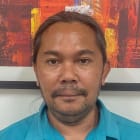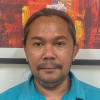Commentary: Hidilyn Diaz, national hero for pandemic-weary Philippines
From a persistent lack of financial resources to baseless accusations from the Philippine government, weightlifter Hidilyn Diaz beat all odds to bag her country’s first Olympic gold medal.
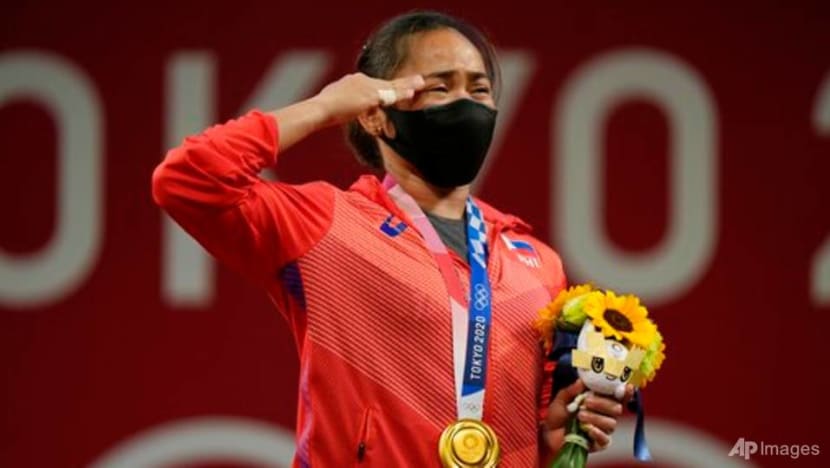
Hidilyn Diaz of Philippines gestures on the podium as she listen to the national anthem after winning the gold medal in the women's 55kg weightlifting event, at the 2020 Summer Olympics, Monday, July 26, 2021, in Tokyo, Japan. (AP Photo/Luca Bruno)
MANILA: Filipinos were united in their triumph when weightlifter Hidilyn Diaz won the first gold medal for The Philippines at the Tokyo Olympics.
Her win was a balm for the sports-mad country, worn out by the longest and strictest lockdown in Southeast Asia.
Filipino athletes have competed in the Olympics since 1924 but have never brought home a gold medal until Diaz did. The 30-year-old native of southern Philippine city Zamboanga defeated her contenders in the women’s 55kg weightlifting class. She won in a record-breaking 127kg clean and jerk event against China’s Liao Qiuyun.
When the gold medal was placed around her neck, warm congratulations immediately flooded social media. Ordinary citizens and public figures like boxing champion Manny Pacquiao praised her for putting the country on the radar at the Olympics.
READ: 'So proud': Philippine weightlifter Diaz hailed for historic Olympic gold
READ: Commentary: We need to talk about why Joseph Schooling crashed in Tokyo
According to Ramon Beleno, a professor at the Ateneo University in Davao, the victory of Diaz helped cheer up Filipinos suffering from on-and-off COVID-19 restrictions imposed by the Philippine government.
“Sports have been our avenue for entertainment. Almost a century we have been waiting for it and it’s a perfect gift for the Filipinos,” says Beleno.
To Ogie Baluma, a 34-year-old small-time merchant who lives in Davao, Diaz’s victory fills him with national pride.
“It feels good to be a Filipino. She’s a legend,” he says. “It’s not just about the gold. She’s the strongest woman living on the planet.”
DIAZ’S ASCENT TO STARDOM
Born on Feb 20, 1991, Diaz grew up poor in a village alongside five siblings. While in elementary school, she helped her father sell vegetables, and when their land was sold, fish.
When those earnings weren’t enough to make ends meet, her family had meals of rice with salt and soy sauce.
Introduced to weightlifting by her cousin, Diaz picked up weightlifting when she was young. She trained with makeshift barbells of plastic pipes and concrete weights shaped in tin cans.
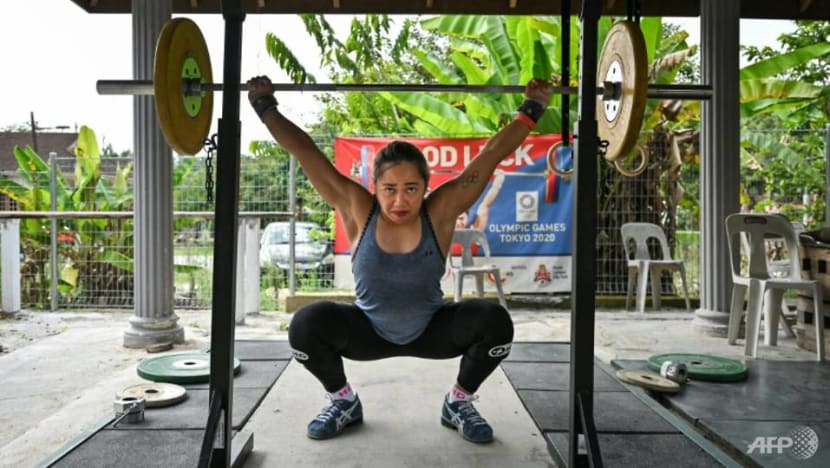
By the time she was 12, she was lifting weights beyond her weight class. Equipment was then donated by friends, coaches and other supporters.
She won in local weightlifting events. With her small income from the competition, she bought her father a motorbike for business.
Eventually, she was invited to the national weightlifting team, and moved from Zamboanga to Manila.
After competing in local events, Diaz made her Olympics debut at Beijing 2008 at just 17 years old. She took part at London 2012 as well, and in 2016, clinched a silver medal at Rio.
READ: How Hidilyn Diaz made Olympic history as the Philippines' first gold medallist
Diaz’s journey had been a breathtaking ascent since. Leading up to Tokyo 2020, she bagged gold medals at the Asian Games of 2018 and the Southeast Asian Games of 2019.
She moved to Malaysia to train for the Tokyo Olympics in February 2020, and was stranded there when COVID-19 shut international borders.
She trained daily in Melaka, at a house owned by a Malaysian weightlifting officer. Because of strict movement restrictions, she had to make do with an open-air garage and even borrowed equipment from neighbours.
READ: Commentary: Simone Biles’ decision to withdraw from Tokyo 2020 should be applauded
A HERO’S WELCOME
Local officials will give Diaz a hero’s welcome at her hometown. Plans are underway to build a concrete memorial in honour of the athlete and her historic achievement.
But things weren’t so cosy between Diaz and Philippine officials. At a press briefing in 2019, then-presidential spokesperson Salvador Panelo presented a matrix that identified people allegedly plotting to oust the administration of President Rodrigo Duterte.
Diaz was among those listed because her social media account was followed by a user who was critical of Duterte’s war on drugs.
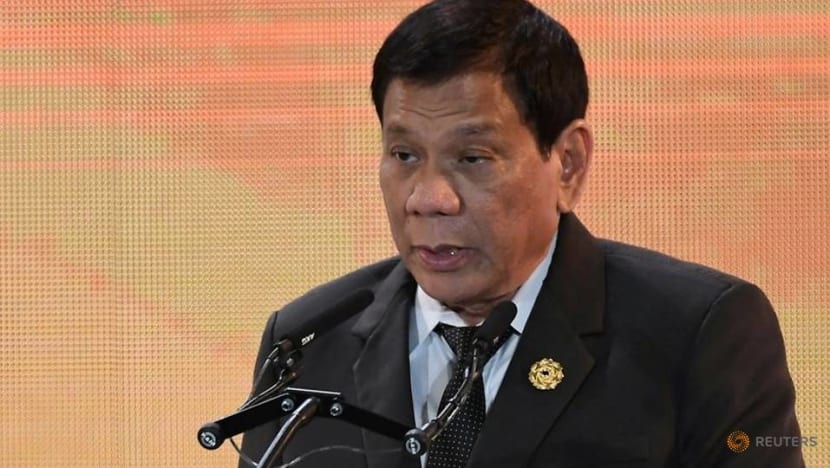
Diaz denied the accusation and said she feared for her and her family’s safety. She added she was only focused on Tokyo 2020, urging the public to support her and her fellow athletes.
Two years later, Panelo congratulated Diaz on her Olympic gold, and offered a half-apology: He was sorry the matrix hurt her feelings, but insisted he did nothing wrong and was only following President Duterte’s instructions.
The government will reward Diaz’s contribution to the country with a new house and US$650,000.
READ: Weightlifting: Philippines' Diaz returns to hero's welcome after winning historic gold
The victory of Diaz is the victory of all Filipinos globally. It’s more than a gold if it opens the gateway to sporting glory for other athletes.
It’s a wake-up call for the central government. With very low support for professional athletes, many have called for more funding. For instance, in October 2020, the Philippine Olympic Committee asked for 510 million pesos (US$10 million) more for Tokyo 2021, more than double the 207 million pesos allocated to it by the government.
Diaz, who admitted prior to Tokyo 2020 that her team was strapped for financial support, gifted her country its first gold medal. How much more could Team Philippines achieve if the government threw its weight behind them?
READ: Commentary: Five new sports were added to Tokyo Olympics. Here’s what might be included next
Catch the Olympics Games Tokyo 2020 LIVE with 14 dedicated channels on meWATCH. Sign in now at mewatch.sg/tokyo2020 and get into the action with Mediacorp, Singapore’s Olympics Network.
Jeff Bansigan is a journalist based in Manila.








